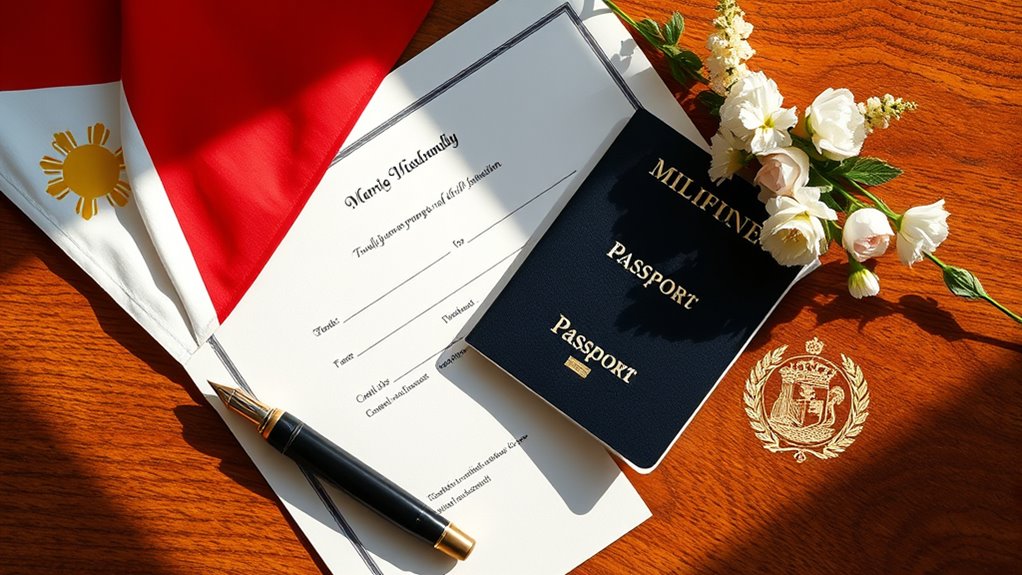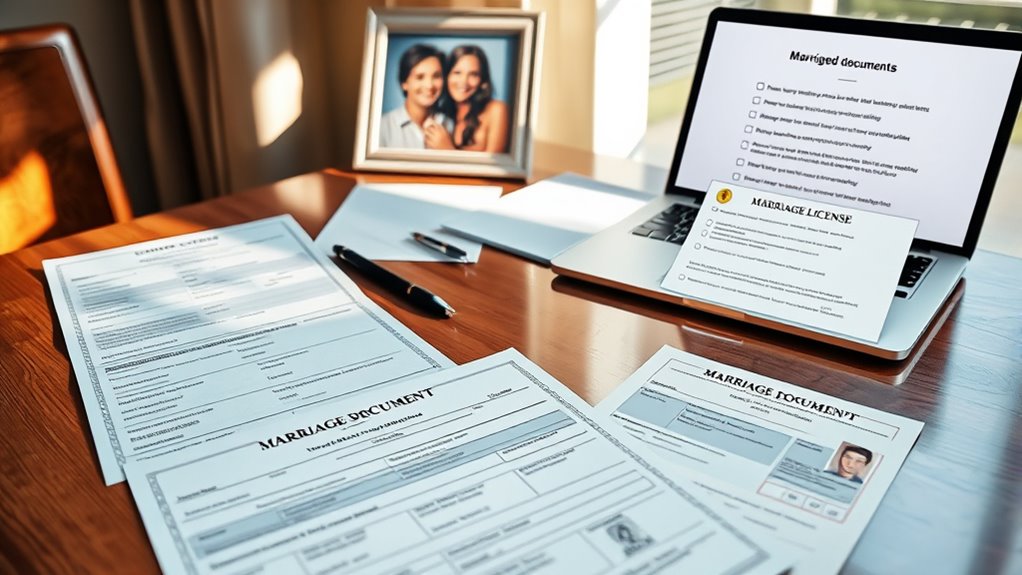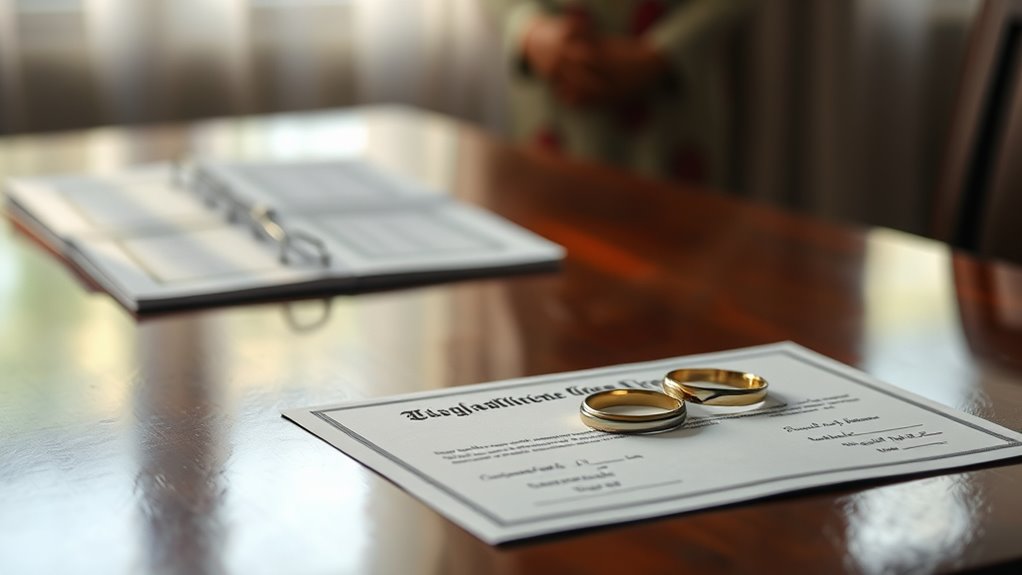To marry a Filipina, you’ll need several essential documents, including a Certificate of No Impediment and a certified birth certificate. If she’s under 25, you’ll also require parental consent and advice. Submit your documents to the Philippine Embassy or local civil registrar, and attend a family planning seminar. Don’t forget to finalize your marriage certificate within 15 days. There’s more to this process that you’ll want to know to avoid any hiccups.
Key Takeaways
- Obtain a Certificate of No Impediment (CNI) and proof of legal capacity to marry from your embassy.
- Submit original or certified copies of your birth certificate and valid government-issued ID.
- If marrying a Filipina under 25, provide documentation of parental consent and advice.
- Attend a family planning seminar before applying for a marriage license in the Philippines.
- Ensure both parties are present for in-person submission of marriage documents to the local civil registrar.
Essential Documents for Foreigners

When you decide to marry a Filipina, gathering the essential documents is crucial to guarantee a smooth process. You’ll need a Certificate of No Impediment (CNI) from your country, confirming your eligibility to marry.
An original or certified true copy of your birth certificate is also required. If you’ve been married before, you’ll need your divorce or death certificate as well.
Additionally, obtain a Certificate of Legal Capacity to Marry from your embassy, which validates there are no legal barriers. A valid government-issued ID is necessary to verify your identity.
Make certain you submit all documents at your embassy upon arrival in the Philippines, so you can proceed with the marriage license application.
Requirements for Filipinas Under 25

For Filipinas under 25, steering the marriage process involves specific legal requirements that reflect their age and maturity.
If a Filipina is under 18, she can’t legally marry in the Philippines, protecting minors from exploitation.
For those aged 18 to 21, parental consent is mandatory and must be documented when applying for a marriage license.
Once she turns 21, she only needs parental advice, which indicates that her family is aware of her decision.
It’s important to gather proof of this advice for the marriage license process.
Understanding these requirements guarantees that young Filipinas navigate the legal landscape responsibly while considering their emotional and financial readiness for marriage.
Procedures for Document Submission

Maneuvering the procedures for document submission is an essential step in marrying a Filipina. Start by mailing your application to the Philippine Embassy, including a cover letter, four notarized Report of Marriage forms, and the original and photocopies of your marriage certificate.
Don’t forget passport copies and the Filipino spouse’s birth certificate.
If you prefer in-person submission, both parties must appear at the local civil registrar with required documents, including valid IDs and a Certificate of No Marriage (CENOMAR).
Complete the application form and attend any necessary seminars.
After the marriage, submit the signed marriage certificate to the local registry within 15 days, ensuring you secure a PSA-authenticated copy for your records.
Legal Considerations for Marriage in the Philippines

Understanding the legal considerations for marriage in the Philippines is essential if you’re planning to tie the knot with a Filipina. You must be at least 18 years old and legally free to marry, meaning no existing marriages should impede your union.
Both parties must be a male and a female, and consent must be freely given before an authorized solemnizing officer, such as a priest or judge. Additionally, attending a family planning seminar is necessary for obtaining a marriage license.
If you’re a foreigner, you’ll need to provide proof of your legal capacity to marry, often requiring documentation from your home country. Ensuring compliance with these legal requirements is vital for a valid marriage.
Important Documentation Process

Steering through the important documentation process is a key step in marrying a Filipina. You’ll need several essential documents, starting with your birth certificate, which must be recent and issued by the Philippine Statistics Authority (PSA).
Don’t forget the Certificate of No Marriage (CENOMAR), confirming your single status, also obtained from the PSA. Next, complete a marriage license application in four copies, signed in front of an authorized officer.
If you’re a foreigner, provide proof of your legal capacity to marry, like a divorce decree or death certificate, translated into Filipino. Valid IDs are mandatory, so bring your passport.
Finally, make certain all documents are organized for submission to avoid delays at the registrar’s office.
Post-Marriage Considerations

Once you tie the knot, it’s crucial to address several post-marriage considerations to guarantee everything’s in order.
First, obtain a PSA marriage certificate for your records. Next, update your civil status on IDs like passports and driver’s licenses. Don’t forget to inform relevant institutions about your marriage status change, including banks and social security systems.
If applicable, decide on a name change and make sure it’s reflected in all your legal documents.
Also, update any financial and social benefits with your employer and review beneficiary details in insurance policies. Inform your local barangay, update voter registration, and notify landlords or schools if necessary.
Finally, verify compliance with any legal implications related to citizenship or property ownership as a married couple.
Frequently Asked Questions
Can Foreign Spouses Work in the Philippines After Marriage?
Yes, you can work in the Philippines after marrying a Filipina. By applying for a 13(a) Non-Quota Immigrant Visa, you’ll be allowed to reside and work legally without needing a separate work permit.
This visa simplifies your employment process, enabling you to explore various job opportunities in both public and private sectors.
Just verify you have the necessary documentation, and you’ll find it easier to integrate into the workforce and local community.
What Is the Process for Changing My Name After Marriage?
Ever wondered how a simple name change can feel like a whole new chapter?
After marriage, you’ll need to start with your marriage certificate as the foundation.
Next, update your Social Security card, then tackle your driver’s license and passport.
Don’t forget to notify your bank too!
Each step is essential to guarantee your new name reflects your marital status, making your shift smoother and more official.
Are Prenuptial Agreements Recognized in the Philippines?
Yes, prenuptial agreements are recognized in the Philippines under the Family Code. They allow you to define your property relations before marriage, serving as binding law between you and your future spouse.
To be valid, the agreement must be in writing, notarized, and signed voluntarily by both parties. While registration isn’t mandatory, it’s advisable for third-party recognition, especially if real estate is involved.
A prenup can help clarify and protect your financial interests.
How Do I Obtain a Marriage Certificate After the Ceremony?
After your wedding, think of your marriage certificate as a treasure map to your future together.
To obtain it, your officiant registers your marriage with the local civil registrar. You’ll need to guarantee all required documents are in order.
Once registered, you’ll receive your marriage certificate, which can later be authenticated by the PSA for official uses.
Don’t forget to request extra copies for safekeeping, just in case!
Can We Get Married in a Church Without a Civil License?
No, you can’t get married in a church without a civil license in the Philippines.
The law requires you to obtain a marriage license before proceeding with any church ceremony. This guarantees that your marriage is legally recognized.
You’ll need to gather necessary documents and wait for the ten-day period after filing for the license.
Once you have it, you can then move forward with your church wedding plans.
Conclusion
So, as you step into the splendid journey of marrying a Filipina, remember the essential documents and dedicated details you need. Don’t delay in diligently gathering your paperwork, and stay savvy about the specific stipulations for both parties. With careful consideration and commitment, you’ll conquer the complexities of legalities. Ultimately, this beautiful bond can blossom into a blissful beginning, paving the way for a lifetime of love and laughter together.









